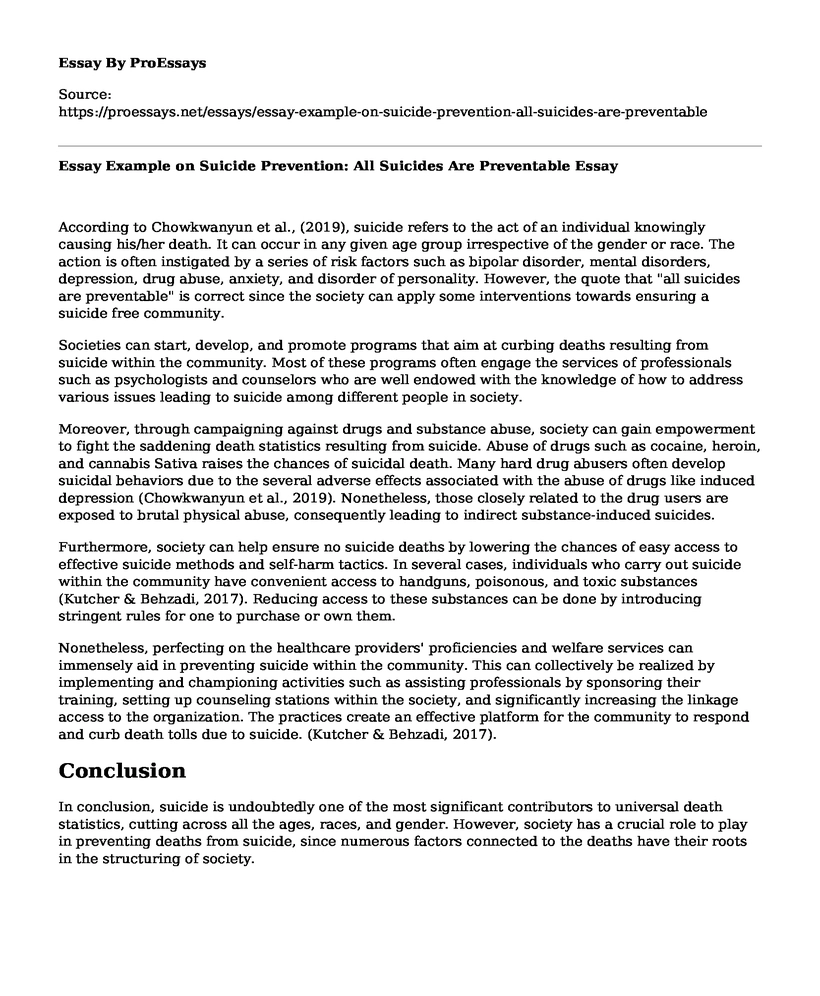According to Chowkwanyun et al., (2019), suicide refers to the act of an individual knowingly causing his/her death. It can occur in any given age group irrespective of the gender or race. The action is often instigated by a series of risk factors such as bipolar disorder, mental disorders, depression, drug abuse, anxiety, and disorder of personality. However, the quote that "all suicides are preventable" is correct since the society can apply some interventions towards ensuring a suicide free community.
Societies can start, develop, and promote programs that aim at curbing deaths resulting from suicide within the community. Most of these programs often engage the services of professionals such as psychologists and counselors who are well endowed with the knowledge of how to address various issues leading to suicide among different people in society.
Moreover, through campaigning against drugs and substance abuse, society can gain empowerment to fight the saddening death statistics resulting from suicide. Abuse of drugs such as cocaine, heroin, and cannabis Sativa raises the chances of suicidal death. Many hard drug abusers often develop suicidal behaviors due to the several adverse effects associated with the abuse of drugs like induced depression (Chowkwanyun et al., 2019). Nonetheless, those closely related to the drug users are exposed to brutal physical abuse, consequently leading to indirect substance-induced suicides.
Furthermore, society can help ensure no suicide deaths by lowering the chances of easy access to effective suicide methods and self-harm tactics. In several cases, individuals who carry out suicide within the community have convenient access to handguns, poisonous, and toxic substances (Kutcher & Behzadi, 2017). Reducing access to these substances can be done by introducing stringent rules for one to purchase or own them.
Nonetheless, perfecting on the healthcare providers' proficiencies and welfare services can immensely aid in preventing suicide within the community. This can collectively be realized by implementing and championing activities such as assisting professionals by sponsoring their training, setting up counseling stations within the society, and significantly increasing the linkage access to the organization. The practices create an effective platform for the community to respond and curb death tolls due to suicide. (Kutcher & Behzadi, 2017).
Conclusion
In conclusion, suicide is undoubtedly one of the most significant contributors to universal death statistics, cutting across all the ages, races, and gender. However, society has a crucial role to play in preventing deaths from suicide, since numerous factors connected to the deaths have their roots in the structuring of society.
References
Chowkwanyun, M., Bayer, R., Galea, S., Bastiampillai, T., Allison, S., Perry, S. W., & Licinio, J. (2019). Correspondence Precision public health: and rising suicide rates.
Kutcher, S., Wei, Y., & Behzadi, P. (2017). School-and community-based youth suicide prevention interventions: hot idea, hot air, or sham?. The Canadian Journal of Psychiatry, 62(6), 381-387. Retrieved from https://doi.org/10.1177/0706743716659245
Cite this page
Essay Example on Suicide Prevention: All Suicides Are Preventable. (2023, May 08). Retrieved from https://proessays.net/essays/essay-example-on-suicide-prevention-all-suicides-are-preventable
If you are the original author of this essay and no longer wish to have it published on the ProEssays website, please click below to request its removal:
- Psychology Course Work Example: Trauma and Crisis Intervention
- Paper Example on Obsessive-Compulsive and Related Disorders
- Paper Example on Chaining to Teach a Functional Self-Help Skill to a Child With Autism
- Essay Sample on Impact of Lifestyle Choices on Health
- Stress Management Speech Paper Example
- Unlock Creativity, Leadership and Innovation - Paper Example
- Essay Sample on Types of Procrastination







